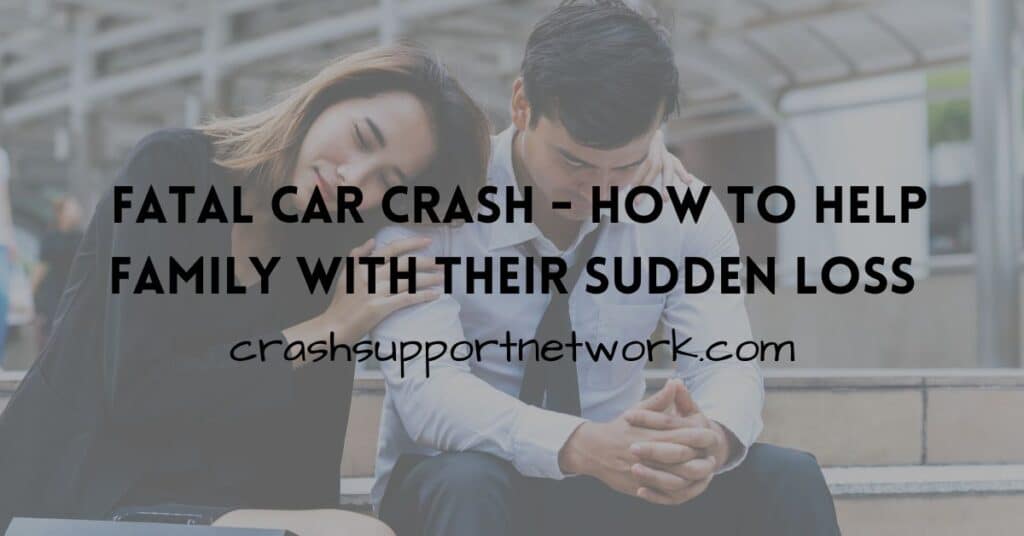
According to the Association for Safe International Road Travel, approximately 1.35 million people die in road crashes each year across the globe; on average 3,700 people lose their lives every day on the roads and no one can explain the emotional turmoil a person goes through when they lose a loved one unexpectedly to a fatal car crash. Dealing with intense emotional pain is a long-term process.
Losing someone you love in a fatal car crash is traumatic and no one can ever prepare to feel that amount of grief. In the hours and days after a fatal car crash, it’s important to keep in touch with the grieving family. Here are three ways you can support them.
Offer to Help
Grieving the loss of a loved one is hard. Loved ones may struggle with day-to-day tasks such as cooking, cleaning, laundry, running errands, mowing the lawn, caring for their children as well as their pets. Offer to set up and share a calendar for other people to send over meals, or order dinner for delivery. Driving and transportation are also a good way to be supportive. It’s very understandable that a person may feel reluctant to drive after losing someone in a fatal car crash. Also, the shock and grief around a sudden death can make it hard for a person to concentrate while driving. Consider offering them rides or arrange for a driver.
Decide what you are able to commit to doing, and then make direct, specific offers. Instead of “Let me know if I can do anything to help”, try to name the task and the time. Send them a text to let them know you are out shopping and ask them what you can bring them or send a small gift to know that you are thinking of them.
Calls Need to Be Placed
In the first few days after a sudden loss, a person may be in shock. They may feel that they are in a fog, a trance, or a bad dream. Offer to contact their employer, school, church, neighbors or any other relevant group.
There is also a long list of things that have to be done after an unexpected death:
- Obtaining a copy of the death certificate.
- Finding the final will and testament or contacting an estate lawyer.
- Paying final medical bills or submitting bills to insurance.
- Contacting the Government.
- Removing the deceased’s name from utilities and services.
- Contact banks.
- Filing a final tax return.
- Alerting their car insurance company, filing a claim and contacting a personal injury lawyer.
- Gathering and organizing information on all assets and debts, such as bank accounts, mortgage, retirement account, student loans.
Ask them if you need their assistance with any of the above as they will be feeling very overwhelmed with this burden of tasks that comes with unexpected loss.
Stay in Touch
While people may rally around to help immediately after an unexpected death, most of us move on while our friends and loved ones are still in mourning. Here are some important reminders to keep in mind.
- Set reminders to check in with them in the weeks and months to come. Take note of the dates of major events and occasions. If you ask someone how they are doing, be prepared to hear the real answer.
- Let them talk about the person they lost. Many people will assume that they don’t want to be reminded of their loss, but the result is that no one talks about the deceased person. Say their name, acknowledge that the loss is now part of their life.
- A fatal car crash is particularly traumatic for the mourners. Many may find comfort in immersing themselves in every detail of the collision. They find it helpful to know what exactly happened and be fully informed about every investigation and report related to the fatal crash. Facts can be comforting to them and could possibly bring closure. Ask them if they found a support group.
- Death from a fatal car crash is hard to grasp and these types of death are extremely difficult on friends and family. Keep in mind that police may be involved and there may also be complicated legal issues. Survivors often feel incredibly guilty that they didn’t do enough to prevent the tragedy.
- Initial offers to help may not be accepted since they may not know where to start or what steps to take. It is also important to remember that many people may be willing to help right away. Once the service has taken place and day-to-day activities resume, always remember that help needs to be continued. Don’t vanish! You should always remain available and willing to help.
The most important thing you can do to help someone who is grieving someone who died suddenly and unexpectedly is to be available and understanding. Always let them know that you are thinking of them and that you are there for them.
S. Dawne McKay is a survivor of a horrific crash that changed her life forever. Dawne shares her personal journey as a Crash Survivor Blogger and also collaborates with crash survivors as Guest Bloggers allowing them an opportunity to share their stories. Dawne is also the author of the book, “Talk Crash to Me – What to Expect After Surviving a Collision and How to Manage Your Recovery” which is available for purchase on Amazon.
The Crash Support Network is a unique one-of-a-kind website consisting of an online support group, a crash survivor blog, a quarterly newsletter, “Sharing Our Recovery” as well as highly informative articles. Our website is based on relationship-building and puts the needs of survivors first by creating a helpful resource for victims and survivors of motor vehicle crashes.



